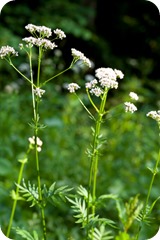Hot flashes and/or night sweats are the most common symptoms that perimenopause/menopause women seek relief for. They can be mild, moderate or severe and can be infrequent or daily and many times a day if not several times per hour and can last an unpredictable amount of months/years. Some women are affected greatly and this can impact mood, sleep, social encounters, work and general quality of life. About 70-80% of women who go through normal natural menopause have hot flashes/night sweats and 90-100% of women with surgical menopause (both ovaries removed) experience them.
In this double blind clinical trial, 76 menopausal women with the chief symptom of hot flashes were enrolled with the treatment group receiving a 225 mg valerian capsule three times per day and the other group placebo, for 8 weeks. Five women from the placebo and 3 from the valerian groups were excluded due to irregular use, inaccurate recording, mild side effects or taking other medications that affect hot flashes. A total of 68 women completed the study. Symptom diaries (although the questionnaire and specifics of this were not reported in the study) were kept. Results were recorded by the participants and collected by the researchers. After 4 and 8 weeks of treatment, the evaluation of results showed a meaningful difference between the valerian group and the placebo group.
At week 4 and week 8 post-treatment, the valerian group had significantly less severe hot flashes (9.82 + 1.87 pre-treatment and 5.23 + 1.52 after 8 weeks) compared with the placebo group (9.96 + 1.84 pre-treatment and 9.86 + 1.95 after 8 weeks). There was no significant change in severity of hot flashes in the placebo group compared with baseline. In addition, at week 4 and week 8 post-treatment the valerian group had significantly fewer hot flashes compared with the placebo group. Valerian pre-treatment was a mean frequency of 7.91 + 30.0 and 4.83 + 0.52 after 8 weeks vs. placebo pre-treatment 7.73 + 42.0 and after 8 weeks 7.75 + 0.32. There was no significant change in frequency of hot flashes in the placebo group compared with baseline.
The purpose of this randomized, double-blind, placebo-controlled study was to evaluate the effect of valerian treatment for 8-weeks on hot flashes. Valerian is an interesting choice, but it does contain some flavonoids, which are phytoestrogenic components and therefore it is a reasonable hypothesis that it may reduce menopause symptoms.
Currently available conventional treatments include various regimens of hormone therapy, conventional non hormonal options such as an SNRI or SSRI, gabapentin, clonidine and possibly an anti-histamine. Efficacy of the non hormonal treatments are less than with adequate doses of estrogen. However, all of these have a benefit and risk profile that needs to be considered by patient and menopause practitioner. Natural treatments that have scientific support span all kinds of plants and nutraceuticals. Some of the plants are phytoestrogen containing plants such as soy, red clover, kudzu, hops and others. Some of the plants that do not contain phytoestrogens include black cohosh, maca, Siberian rhubarb, St. John’s wort, pine bark and kava. Even fish oils have shown some efficacy in treating hot flashes. These herbal/nutraceutical treatments can be quite effective in reducing severity and frequency of hot flashes, but are also sometimes not effective, or some times not effective enough. Having more options to help women with hot flashes and/or night sweats is extremely helpful in order to address the diverse array of clinical situations and individual needs/choices based on benefits and risks.
There seems to be quite a bit of herbal research in women’s health coming out of Iran which I am pleased about. I will add this study and this tool to my list of options.
Reference
Mirabi P, Mojab F. The effects of valerian root on hot flashes in menopausal women. Iran J Pharm Res. 2013;12(1):217-222.


